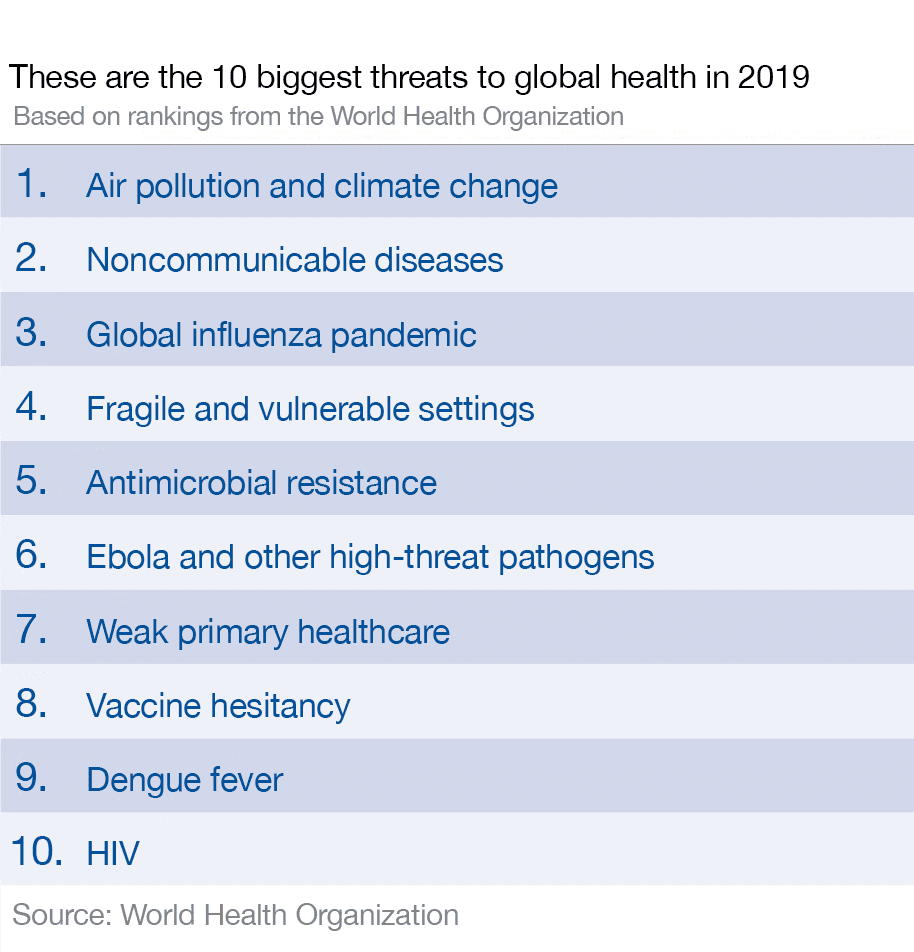Climate change, poverty and inequality, terrorism and violence, refugees and migration, gender equality and women’s empowerment, education and access to information, humanitarian crises and natural disasters, health and pandemic preparedness, digital divide and cybersecurity, environmental degradation and biodiversity loss are the ten most pressing global issues facing the world today. These challenges need to be addressed by promoting sustainable development, protecting ecosystems, reducing pollution and waste, promoting conservation and biodiversity, investing in health infrastructure, research and development, and pandemic preparedness and response, promoting education and access to information, and breaking down patriarchal norms and attitudes. Global cooperation, action, and investment are required to find sustainable solutions that promote social, economic, and environmental progress for all.
1. Climate Change
Climate change is one of the biggest global issues that we are facing today. The rise in global temperatures caused by greenhouse gas emissions is leading to extreme weather conditions, melting glaciers and ice caps, sea level rise, and loss of biodiversity.
The world needs to adopt measures to mitigate climate change by reducing greenhouse gas emissions, developing alternative energy sources, and increasing our adaptation and resilience to the impacts of climate change.
2. Poverty and Inequality
Poverty and inequality remain significant global issues affecting millions of people across the globe. The world needs to address the root causes of poverty and inequality, such as lack of access to education, healthcare, and basic amenities, by allocating resources to support sustainable development, empowering disadvantaged communities, and promoting economic growth.
3. Terrorism and Violence
Terrorism and violence pose a significant threat to global peace and stability. The world needs to work together to address the root causes of terrorism and violence, such as socio-economic exclusion, political marginalization, and cultural conflicts, by promoting human rights, rule of law, and tolerance, and by countering violent extremism and radicalization.
4. Refugees and Migration
Refugees and migrants continue to face immense challenges and hardship as they flee conflict, persecution, and poverty in their home countries. The world needs to provide adequate support and protection to refugees and migrants, uphold their human rights and dignity, and address the root causes of forced displacement and migration.
5. Gender Equality and Women’s Empowerment
Gender inequality and discrimination against women and girls remain prevalent in many parts of the world, limiting their access to education, healthcare, decent work, and political participation. The world needs to promote gender equality and women’s empowerment by addressing the root causes of gender bias and discrimination, providing opportunities and resources for women and girls, and breaking down patriarchal norms and attitudes.
6. Education and Access to Information
Education and access to information are keystones for sustainable development and progress, yet millions of people still lack access to basic education and information services. The world needs to promote education and access to information by allocating resources to support education infrastructure, making education affordable and accessible, and promoting digital literacy and connectivity.
7. Humanitarian Crises and Natural Disasters
Humanitarian crises and natural disasters continue to cause significant human suffering and displacement across the globe. The world needs to develop effective disaster management and relief systems, ensure timely and adequate assistance to affected populations, and address the root causes of humanitarian crises and natural disasters.
8. Health and Pandemic Preparedness
Health and pandemic preparedness have become critical global issues, given the ongoing COVID-19 pandemic and the growing threat of future pandemics. The world needs to invest in health infrastructure, research and development, and pandemic preparedness and response, and promote global cooperation and coordination to address health challenges and emerging diseases.
9. Digital Divide and Cybersecurity
The digital divide and cybersecurity have emerged as significant global issues, given the growing reliance on digital technologies and the increasing risk of cyber threats and attacks. The world needs to bridge the digital divide by providing access to digital technologies and promoting digital literacy and inclusion, and promote cybersecurity by developing effective cybersecurity policies and frameworks, enhancing cybersecurity infrastructure, and promoting international cooperation and dialogue.
10. Environmental Degradation and Biodiversity Loss
Environmental degradation and biodiversity loss are significant global issues that continue to threaten the health and well-being of both human and non-human life on the planet. The world needs to address the root causes of environmental degradation and biodiversity loss by promoting sustainable development, protecting ecosystems, reducing pollution and waste, and promoting conservation and biodiversity.
In conclusion, the above ten global issues represent some of the most pressing challenges facing the world today. They require global cooperation, action, and investment to address the root causes and find sustainable solutions that promote social, economic, and environmental progress for all.
